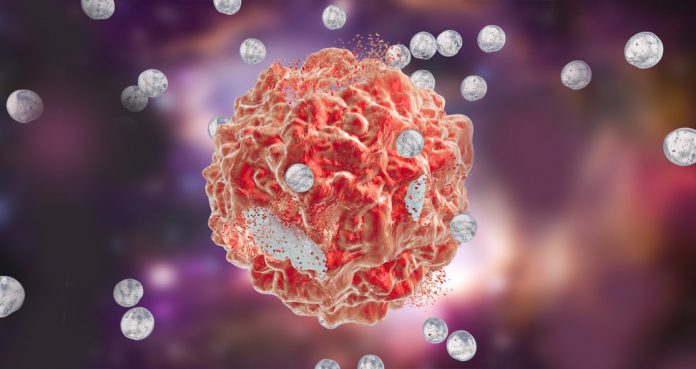A study, published in the journal Science Advances, has found that the new DART nanoparticle therapy crosses healthy cells and tissues and targets tumor cells to treat advanced cases of breast cancer by releasing a cytotoxic agent called paclitaxel, a chemo drug.
Researchers from the University of Maryland School of Medicine (UMSOM) developed the DART nanoparticle drug formulation that has been found more effective than a standard nanoparticle therapy to treat metastatic breast cancer.
Study co-author Dr. Jeffery Winkles said, “The marketed drug Abraxane, a nanoformulation containing paclitaxel that is currently used to treat women with aggressive breast cancer, is an effective agent, but it was not designed to selectively deliver paclitaxel to only the cancerous cells within the body.”
“Our DART nanoparticle specifically targets the Fn14 receptor found abundantly on breast cancer cells; it uses this receptor to gain entry through the plasma membrane and deliver the drug to destroy the cancer,” added Dr. Winkles.
The researchers developed and tested a new nanoparticle therapy to deliver the drug paclitaxel in order to treat triple-negative breast cancer.
Another study co-author Dr. Graeme Woodworth said, “After much initial anticipation and some disappointments in the field, nanoparticle delivery systems for cancer treatment are starting to show real promise for patients.”
“We established a proof-of-concept with this study, outlining the design of an optimized nanoparticle delivery system that balances the specific binding to cancer cells while minimizing non-specific, off-target binding to other cells in a very fine-tuned way,” he added.
Co-author Dr. Anthony Kim said, “Many drug delivery carriers exhibit nonspecific binding to healthy cells and tissues in addition to the diseased cells they are targeting, which often leads to unintended side effects or toxicities.”
“This DART nanoparticle platform has unique capabilities to improve therapeutic delivery to difficult-to-treat locations within the body, while also allowing us to potentially increase the maximum tolerated dose of the encapsulated drug without increasing side effects to patients,” added Dr. Kim.
The researchers filled the optimized DART nanoparticle formulation with paclitaxel and tested it in animals with triple-negative breast cancer tumors. They found the new formulation significantly increased the overall survival rate. “This is a compelling finding and significant step forward in the use of nanoparticles to treat cancer,” said UMSOM Dean Dr. E. Albert Reece. “Our faculty continue to lead in making breakthrough discoveries that help patients with the most difficult to treat cancers.”





















